

Articles in English. This morning I was watching the recorded plenary talk that Paul Seligson gave at IATEFL Chile 2016 whose title was Hooking English: using song lines to build on existing knowledge.

There are many ideas in his talk that resonate with my vision and use of songs in the classroom. The novelty factor of playing a full song towards the end of the lesson as a kind of reward or relief from having tackled some more rigorous kind of work has worn off now that our learners have the means to go on the Internet and in practice listen to anything of their choice. We need to get a little more creative and move with the times. There is still room for fill in gaps but: a) we can be more specific about the kind of missing language we would like the students to identify or understand. b) just a few lines of the song may serve the purpose. And here is my favorite activity from Paul’s talk: Choose a few lines from a song and create a fill in gaps exercise by replacing “a”, “an”, “the” with dotted lines.
Quantity - partitives - containers - exercises. Quantifiers / Determiners Explanations. Some & Any “Some and any” are determiners and they express an indefinite quantity or number.
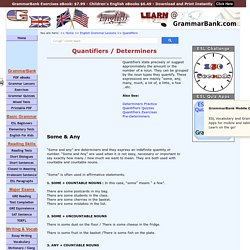
“Some and Any” are used when it is not easy, necessary or important to say exactly how many / how much we want to mean. They are both used with countable and countable nouns. “Some” is often used in affirmative statements. 1. There are some postcards in my bag. Determiners. Quantifiers - English Grammar. Quantifiers - English Grammar.
English Grammar. We use quantifiers when we want to give someone information about the number of something: how much or how many.
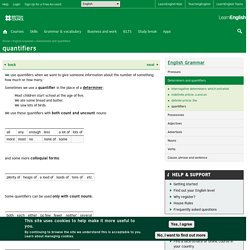
Sometimes we use a quantifier in the place of a determiner: Most children start school at the age of five. We ate some bread and butter. We saw lots of birds. We use these quantifiers with both count and uncount nouns: and some more colloquial forms: Some quantifiers can be used only with count nouns: Some quantifiers can be used only with uncount nouns: And, particularly with abstract nouns such as time, money, trouble, etc:, we often use: Members of groups You can put a noun after a quantifier when you are talking about members of a group in general… Few snakes are dangerous.Both brothers work with their father. …but if you are talking about a specific group of people or things, use of the … as well. Grammar Lessons - Countable and Uncountable Nouns (count and uncount nouns) Quantifiers in English grammar. In English grammar, a quantifier is a word (or phrase) which indicates the number or amount being referred to.
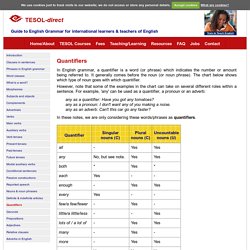
It generally comes before the noun (or noun phrase). The chart below shows which type of noun goes with which quantifier. However, note that some of the examples in the chart can take on several different roles within a sentence. For example, 'any' can be used as a quantifier, a pronoun or an adverb: any as a quantifier: Have you got any tomatoes? In these notes, we are only considering these words/phrases as quantifiers. before a noun on its own: fewer answers before an adjective and noun: some useful phrases before an adverb, adjective and noun: every really pleasant experience Normally two quantifiers cannot be used together before the same noun.
A little less noise a few more questions every few minutes. Determiner- Explanation and Examples. The term “determiner” refers to a grammatical form which is used to indicate further information about a noun.
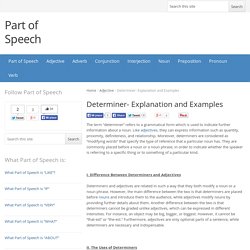
Like adjectives, they can express information such as quantity, proximity, definiteness, and relationship. Moreover, determiners are considered as “modifying words” that specify the type of reference that a particular noun has. Grammar Glossary. • Determiners make up one of seven English word classes.
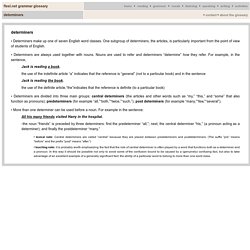
One subgroup of determiners, the articles, is particularly important from the point of view of students of English. • Determiners are always used together with nouns. Nouns are used to refer and determiners “determine” how they refer. How to Use Articles (a/an/the) It's Here: A new look for the Purdue OWL!
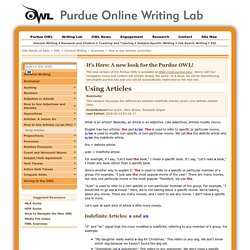
The new version of the Purdue OWL is available at Worry not! Our navigation menu and content will remain largely the same. In 6 days, we will be discontinuing owl.english.purdue.edu and you will be automatically redirected to the new site. A, AN, THE – Articles in English. Definite article: the. The definite article the is the most frequent word in English.
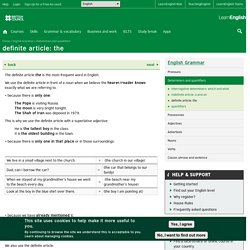
We use the definite article in front of a noun when we believe the hearer/reader knows exactly what we are referring to. • because there is only one: The Pope is visiting Russia.The moon is very bright tonight.The Shah of Iran was deposed in 1979. This is why we use the definite article with a superlative adjective: He is the tallest boy in the class. . • because there is only one in that place or in those surroundings: • because we have already mentioned it: A woman who fell 10 metres from High Peak was lifted to safety by a helicopter. Grammar: 8 rules for using 'THE' in English.